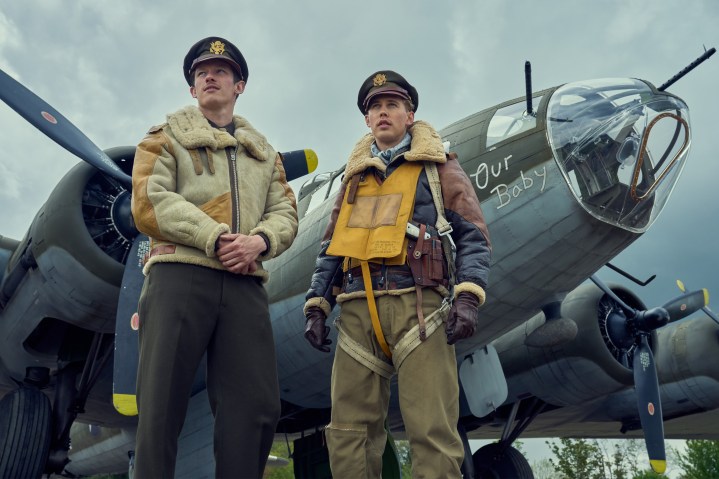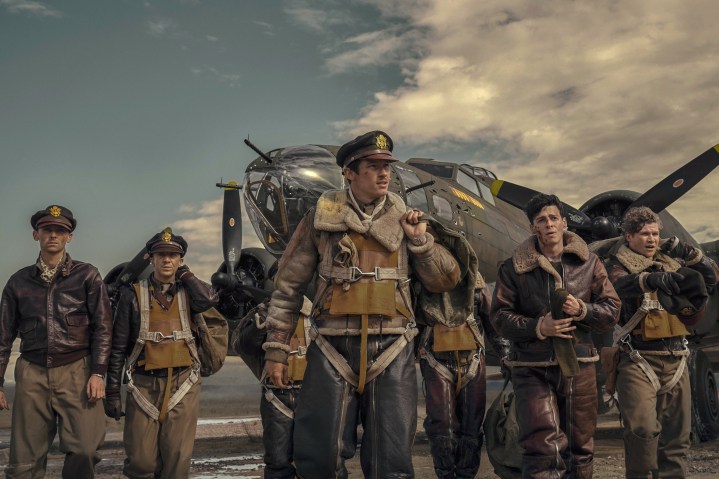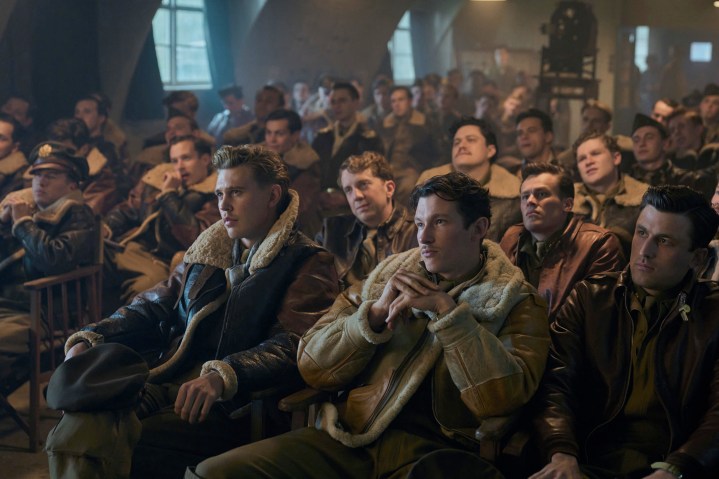
Masters of the Air is the third and final installment in the trilogy of World War II TV dramas that Tom Hanks and Steven Spielberg have been producing for well over 20 years now. Their efforts began with 2001’s Band of Brothers and continued with 2010’s The Pacific, both of which took home the Emmy for Outstanding Miniseries in their respective years. Both aired on HBO, which was seen at the time as the only place where expensive, truly prestige miniseries like them could be made. A lot’s changed since then.
Case in point: Masters of the Air isn’t an HBO production. The miniseries, which follows the members of the real-life 100th Bomb Group and their bombing efforts in Nazi-controlled regions of WWII-era Europe, premiered last week on Apple TV+. It isn’t any less expensive or star-studded than Band of Brothers and The Pacific. On the contrary, one could argue that it’s an even bigger series than either of those two dramas. Why, then, was Spielberg and Hanks’ most ambitious WWII miniseries to date made for Apple TV+ rather than HBO, the home of its two sister shows?

When you watch Masters of the Air, the first thing you’ll likely be struck by is the sheer craftsmanship on display. The series, which was directed by talented directors like Cary Joji Fukunaga, Dee Rees, Anna Boden, and Ryan Fleck, is rich in vibrant colors and thick shadows. It’s polished yet rugged, massive yet intimate, and it abandons the Saving Private Ryan-inspired, on-the-ground style of Band of Brothers and The Pacific in favor of a sleeker and more graceful aesthetic that fits its story, most of which takes place in the air as its central pilots fly their missions over Europe and Africa.
Once upon a time, shows as big and expensive as Masters of the Air were hard to find. Nowadays, not so much. Netflix and Amazon Prime Video have changed the TV landscape forever by favoring the kind of short-order, 8-to-10-episode format that, in America at least, was once a defining trait of HBO’s original programming. Shows like Game of Thrones and Stranger Things have additionally made blockbuster-sized budgets an increasingly common phenomenon on television.
Amid all these revolutionary changes — and even as Prestige TV has become an all-encompassing term meant to describe Hollywood’s current, higher-quality wave of episodic programming — HBO has held onto the title of TV’s most prestigious platform. Netflix’s output has always been too diffuse and diverse in terms of tone, content, and quality for it to emerge as an actual contender for that title, and the same goes for Prime Video. Newer services have, meanwhile, struggled to build perceptible brands through their content. Of all of them, only Paramount+ has come closest to achieving that by becoming the ostensible home of the Taylor Sheridanverse (i.e., shows like Yellowstone that are popular, though not among awards voters).

By throwing as much money and star power as it can at viewers, though, Apple TV+ has grown into an increasingly formidable service. No matter the strength of their storytelling, Apple’s shows have all boasted the same, impressive production quality and expensive sheen, and the platform’s library has become considerably robust in a shockingly short amount of time. It has established itself as a home for blockbuster sci-fi shows like Silo, Foundation, and Severance, as well as less high-concept, but no less great shows like Mythic Quest, The Buccaneers, Bad Sisters, and Slow Horses, the latter of which has emerged as one of the platform’s unlikeliest crown jewels.
Apple TV+ has, in other words, become a place where both talented writers and huge stars can go to make TV shows that will be, at the very least, produced at an unwaveringly impressive high level. The same has long been true of HBO.

Ever since it produced acclaimed, form-redefining shows like The Sopranos, The Wire, and Deadwood in the late 1900s and early 2000s, HBO has been known among TV viewers as a place where they can expect a certain level of greatness to almost always be met. Recent high-profile misfires like The Idol, as well as the David Zaslav-mandated dilution of its brand via the unnecessary restructuring of HBO Max, have dinged its reputation a bit, but not so much as to make viewers completely lose faith. It doesn’t, in fact, seem like HBO is in any danger of losing its foothold as one of Hollywood’s premier TV producers anytime soon.
Will it still be known in a few years as the home of Prestige TV, though? That seems less clear, especially if the already blurry line separating HBO and Max originals continues to grow less immediately perceptible to casual consumers. Either way, Apple’s seemingly endless flow of revenue and it’s time-proven, star-driven content formula make it the first genuine competitor for the Prestige TV crown. The platform has long since outgrown its reputation as one that was kept alive by its few, Ted Lasso-sized hits. Should it continue producing prestigious, high-cost shows like Masters of the Air, which once would have only been made by HBO, then its place within the streaming marketplace may only continue to grow stronger, too.
The question may not, therefore, be how much longer HBO will be seen as the beating heart of the Prestige TV world, but how long it will be before Apple TV+ has earned the same level of built-in trust among viewers that has long defined and elevated its Warner Bros. Discovery-owned competitor. If the service sticks to its current strategy, the answer to that question may very well be: Not long.
New episodes of Masters of the Air premiere Fridays on Apple TV+.
Editors’ Recommendations

